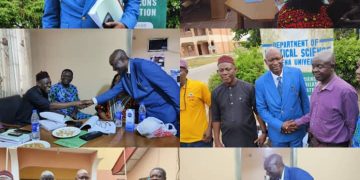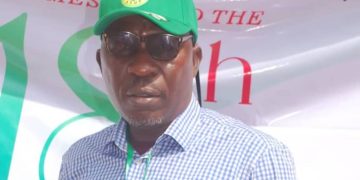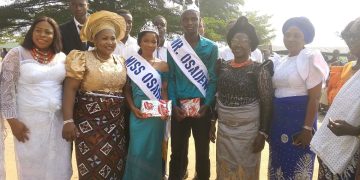By Ben Nwanne
The most senior tenured professor at Delta State University, Abraka, Professor Sunday Honesty Okobia Egboh, of the Chemistry Department has retired from the services of the University having attained the mandatory retirement age of 70 years on November 23, 2022.
One of the activities marking his exit from the University was a Valedictory Lecture entitled “Academic Entrepreneurship: Rescuing the Future” delivered by the Professor in which he made a robust case for tertiary institutions to establish functional Entrepreneurial Centres to improve their finances and empower their students with entrepreneurial and other skills.
He however regretted the subsisting conditions of Nigeria’s higher education, describing them as “unacceptable and inconsistent” with the economic, social, political development roles envisaged for them.

According to him, graduates should be potential entrepreneurs, job creators, self-employed or employers of labour.
“The increasing competitiveness of modern industry makes it desirable for all graduates irrespective of their field of study to have adequate knowledge and skills in their chosen field in addition to those in entrepreneurship development, innovation and basic management”, he noted.
Professor Egboh, who graduated First Class from the University of Ife, (now Obafemi Awolowo University) Ile-Ife in 1976 threw some light on the concept by defining Entrepreneurship as a process of creating customer-defined value by innovating and exploiting resources beyond control, the willingness and ability of an individual or group to seek investment opportunities, establish and run an enterprise successfully, a process of creating value/wealth by bringing together resources in new ways to start a venture that benefits customers and rewards its founders for innovation.
The Professor of Industrial/ Polymer Chemistry and Entrepreneurship who had put in twenty-eight years of active and productive scholarship at the University, commended the National Universities Commission (NUC), National Board for Technical Education (NBTE) and National Commission for Colleges of Education (NCCE) for being responsive to societal needs by directing all institutions to undergo compulsory entrepreneurship education and training, beginning from the year 2005.

Buttressing the argument of the National Educational Regulatory Agencies, Professor Egboh noted “The primary goals to enhance the production of global competitors and self-reliant graduates expected that graduates from these institutions should have the opportunities to acquire adequate knowledge and skills in entrepreneurship, innovation, business Creator and imbibe the entrepreneurial spirits”.
According to Professor Egboh, two-time Head of Department of Chemistry and two-time Dean of the Faculty of Science, the importance of Entrepreneurship included its contribution to the nation’s economic development through job creation, prime mover of industrial development, wealth creation and self-reliance and a major driver of innovation.
Other advantages are competitiveness and growth, wealth creation capable of decreasing poverty, growth of national economy in order to meet the United Nations’ seventeen (17) Sustainable Development Goals, reduction of incessant civil/social unrest due to poverty, injustice, inequality and tackling climate change among others.
According to Professor Egboh who hit the professorial rank in 1993 at just 41, the United States of America (USA) was the best country in the world by global entrepreneurship index with 86.8 index.
He cited the other four top countries to include Switzerland, Canada, Denmark and the United Kingdom.
Of the twelve countries considered best for entrepreneurs, Nigeria was nowhere to be found, despite all the heaps of write-ups about the ease of doing business in the country.
Having addressed Entrepreneurship in general, he then directed his considerable knowledge and experience to Academic Entrepreneurship which he defined as the leadership process of creating economic value through the acts of organisational creation, renewal of innovation that occurs within or outside the academic institutions that results in research and technology commercialisation.
In his view, Academic Entrepreneurship would include but not limited to consulting, large-scale science projects, external teaching, testing, patenting, licensing and technology transfer.
Professor Egboh observed that the world had moved away from raw material resources to a knowledge-based economy, urging that Nigeria must not be left behind.
He cautioned that Academic Entrepreneurship activities should not be solely evaluated through economic ventures to the Universities but should be considered by wider social and economic benefits such as the diffusion of knowledge or the contributions to employment.
Professor Egboh who has been described as one of the most impactful scientific researchers of his generation, had two Commonwealth Universities Fellowships, Federal Government of Nigeria scholarship, Third World Academy Fellowship and the Finnish Government Scholarship for Research.
In a moving tribute to the scientist of note, the Vice Chancellor, Professor Andy Egwunyenga extolled the sterling qualities of the Valedictory Lecturer with whom he shares the same Faculty of Science “For me as a member of the Faculty of Science, it is a very emotional moment, recalling the productive moments we shared in the growth and development of the Faculty”, he declared.
“I am reminded that my time is ticking too, particularly the imperative of having to also give an account of my academic and professional service to our beloved University”.
Describing Professor Egboh as “one of the finest academics of his time”, the Vice Chancellor who is giving Delsu an enlightened and committed leadership, observed that “Valedictory Lectures of the University should be seen beyond the opportunity for the distinguished lecturer to reminisce on his life in the University but also an indication of the university’s growth and maturity. This lecture has provided us the opportunity of not only appreciating and learning from the experiences of Professor Egboh but also reflecting on our own career and the challenges we face”.
Professor Egwunyenga who is just a week away from his third anniversary as Vice-Chancellor noted that despite his accomplishments, Professor Egboh remained “simple and honest”.
He used the opportunity to interrogate the concept of humility in science. Leaning on Amanda King of Yale School of Medicine who asserted that there is one trait that (almost) every successful scientist seems to possess; humility.
In his words, “Humility does not mean meekness. Humility does not mean unconditional deference. Humility does not mean being docile; it does not mean not standing up for what you believe in; including when you believe in your scientific findings. Humility means being open to the possibility of being wrong, being willing to consider other people’s ideas and being respectful of your seniors, peers and subordinates. Above all, humility means being respectful of science, being respectful of facts and proven figures”.
Not done with the Valedictory Lecturer, the Vice Chancellor continued: ‘’In the laboratory and classroom, Professor Egboh is very strong and assertive in exposing science. He is loyal to science. He embodies the sacred attributes of great scientists: determination, replication, parsimony and philosophic doubt”.
The first-rate scientist that he is, the Vice Chancellor would not let any opportunity to be empirical slip by. In order to have an unbiased view of the Valedictory Lecturer, he spoke to seven of Prof Egboh’s peers at the University.
All of them spoke in the same vein, praising him for his exemplary leadership, friendly and peaceful disposition.
They tagged him as the father of chemistry, who has helped move the Department and Faculty to greater heights, being largely responsible for formulation of academic programmes and human resource development of the Department.
Professor Ben Nwanne, is the Director, Ceremonials, Information and Public Relations, Delta State University, Abraka.













